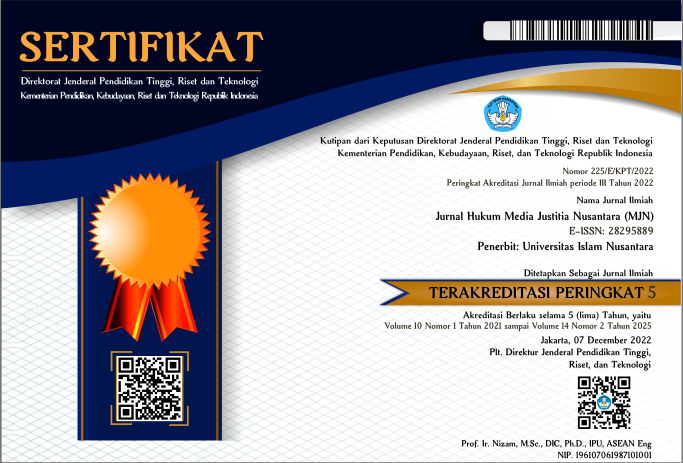Eksistensi Pidana Mati Dalam Persfektif KUHP (Studi Kasus Pembunuhan Berencana Disertai Mutilasi Korban Berdasarkan Putusan Mahkamah Agung No. 25 PK/PID/2012)
DOI:
https://doi.org/10.30999/mjn.v8i1.662Keywords:
Death Penalty, Premeditated Murder, Criminal LawAbstract
Serious crimes and capital punishment in the history of criminal law are two components of closely related issues. This is apparent in the Indonesian Criminal Code which threatens serious crimes with capital punishment. Implementation of capital punishment reap the pros and cons this is motivated by various reasons. Plot murder accompanied by mutilation is a motive for murder committed sadistic and cruel, the motive is done to eliminate traces of deeds that have been done. Planning murder coupled with mutilation as an aggravating factor may be subject to a death sentence, this is because in murder it is not a qualified offense as the basis of ballast. The problem identification in the writing of this thesis involves: how is the existence of capital punishment for the crime of premeditated murder and how the criminal law enforcement related to capital punishment to murder murder is accompanied by mutilation as a burden. The research method used in this compiler is by using the normative juridical method while the specification of writing in this thesis is descriptive analysis, the research stage in this study is primary data obtained from field research and secondary data in the form of primary legal materials, secondary law materials and tertiary legal materials. Based on the description and analysis of the problem it is known that the existence or existence of capital punishment for the crime of premeditated murder is still maintained and valid until now in Indonesia, as it has been in accordance with the provisions of Article 340 of the Criminal Code. The existence of capital punishment as one of the criminal types that is still recognized in the Criminal Law System in Indonesia, is often associated with absolute theory in criminal prosecution. Criminal acts committed by perpetrators are considered very evil, because it interferes with public security, threatens the safety of the people, and is seen as an extraordinary crime (extra ordinary crime). In relation to the crime of premeditated murder as mentioned in Article 581 of the Criminal Code Bill, it also includes a capital punishment, but it can be threatened alternatively with other criminal types, such as life imprisonment or imprisonment of a minimum of five years and a maximum of 20 years. In this case, the draft of the Criminal Code does not specify mutilations specifically as a criminal offense, but if viewed from the provisions of Article 55 paragraph (1) of the Criminal Code Bill, then mutilation may constitute a motive and purpose of committing a crime (letter b); how to commit a crime; as well as the attitude and actions of the producers after committing a crime. As for the suggestion to be conveyed is the government must still maintain the threat of capital punishment by making the rules clearly and firmly against the perpetrators of criminal acts of premeditated murder. The need of the Indonesian Criminal Code is urgent, the government is reasonable, to immediately enact it, so that the provisions contained in Article 55 of the Criminal Code Draft can be used as a guideline for the judge in the imposition of criminal verdict against murder murder with mutilation as incriminating, law, namely the creation of legal certainty, legal benefit, and legal justice.
Downloads
Published
17-10-2019
How to Cite
Priyono, P. (2019). Eksistensi Pidana Mati Dalam Persfektif KUHP (Studi Kasus Pembunuhan Berencana Disertai Mutilasi Korban Berdasarkan Putusan Mahkamah Agung No. 25 PK/PID/2012). JURNAL HUKUM MEDIA JUSTITIA NUSANTARA, 8(1), 10–22. https://doi.org/10.30999/mjn.v8i1.662
Issue
Section
Article













